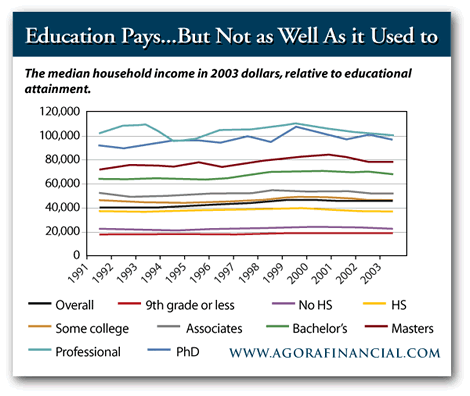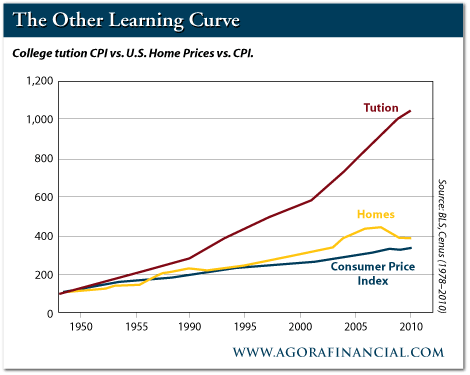How significantly does a university degree get you? If you consider you are going to automatically generate a far better task, standing, and larger shell out, congratulations. You’ve bought into the fantasy.
Increased schooling in The united states is a bubble. There are exceptions, of class. What Large 3 consulting company can argue with a Harvard MBA? But by and large, the development is clear.

This bubble, according to Agora Financial’s Eric Fry, is rooted in a perception:
When upon a time, a college or university education and learning in The us was a just one-way ticket to a superior-paying out position and a lofty socio-financial status. Element of its value derived from the actuality that a college or university training was reasonably scarce. In 1950, only about 5% of all Us residents held a bachelor’s degree.
Due to the fact this 5% tended to fare so considerably far better than the relaxation of the American populace, heaps of folks started to inquire them selves, “Why not mail as quite a few young ones as possible to school?”
The number of Us residents with higher education levels has increased fivefold given that 1950, according to Fry. Meanwhile, the amount of money people pay back for a bigger instruction has “skyrocketed 439 percent because 1982. Usual source and demand simply cannot start out to reveal charge raises of this magnitude,” writes to the Washington’s Examiner’s Glenn Harlan Reynolds, quoting an write-up in Revenue Journal.

Two matters are driving this increase:
1) Simple Funds
Sallie Mae, the university student lending powerhouse originally fashioned as a federal government-sponsored business in the 1970s, created it straightforward for learners, numerous with inadequate to no credit history, to get their fingers on billions of pounds in federally insured college student loans.
Fry writes:
In accordance to FinAid.org, the whole amount of money of funds People in america have borrowed on governing administration and private college student loans at $830 billion has surpassed the overall American purchaser balance on credit history cards, only $827 billion.
Media reports point out that lots of of these pupils really don’t clearly comprehend the phrases of their loans. The moment they graduate college or university, they are stunned by increased personal loan payments than they can pay for.
Nevertheless better education is 1 of the most rewarding business enterprise marketplaces in the state. No college, irrespective of whether federal government-operate, non-financial gain or non-public, advantages from training students how to select an reasonably priced diploma in advance of they in fact go out and get just one.
For case in point, there is no place to spending $100,000 on a Harvard degree in, say, social do the job if your employers a) do not care where by your Masters is truly from, and b) your income will only go as significant as $40,000 per calendar year. College students really should often make absolutely sure the math adds up in advance of acquiring a diploma. But which is not a thing brazenly promoted in the marketplace. And why would it be?
The belief that a school training routinely gets you a higher-earning work also “spawned myriad scholarship applications (and) a faculty-development growth,” writes Fry:
Have been it not for Sallie Mae, aspiring faculty graduates could never have borrowed much a lot more funds than they could at any time hope to repay universities could never have started to imagine that they are worth what they cost professors could hardly ever have acquired their coddled life and the cost of a college or university education could never ever have appreciated perfectly past any relationship to its correct financial value.
In spite of this, universities perpetuate the belief that every single degree they supply is similarly beneficial.
2) A Proliferation of Faculties
Online universities, specifically for-earnings kinds, have proliferated in new several years. Non-common students–stay-at-house mom and dad, people looking for a 2nd occupation, learners who really do not qualify for classic universities, and so on.–find on-line universities specifically powerful. They comprise an inflow of folks acquiring levels.
For-earnings schools run underneath one particular rule of thumb: He who markets the toughest, receives the most organization. Efforts assortment from recruiters’ compensation being tied to enrollment quantities to a relentless affiliate on the net advertising and marketing hard work (Google “on-line schools” and you are going to see what I mean).
For-profits also stay away from failing college students. They have to have to preserve their prospects pleased. In lots of conditions, learners pay out a large amount of money (or consider on a good deal of personal debt) for their levels. They assume to pass. It is not in the school’s best curiosity to fall short college students, or even give them marginal grades.
Yet issuing levels to incompetent learners devalues degrees in basic. If any person can get a diploma, what precisely does it show? As the proportion of the workforce with higher education degrees has gone up, degrees, with some exceptions, have turn into considerably less valuable.
Without a doubt, in accordance to this AZ Central posting:
Nationally, for-revenue colleges had the highest share of defaults in the United States in 2007: 11 per cent. Neighborhood schools had a almost 10 percent amount, and private, non-income universities had the most affordable costs, at 3.7 percent, in accordance to the U.S. Office of Education and learning.
University officers say for-profit schools serve an crucial purpose. Like community schools, they have additional-lenient admission criteria and entice larger percentages of students in economic want: lessen-cash flow, minorities and older than 25. Officials say this clarifies why extra students struggle with repaying pupil financial loans.
In other phrases, the for-revenue program has captivated lots of college students who just cannot find the money for their instruction, but get levels in any case.
What’s the True Price of a Degree?
The Washington Examiner’s Glenn Reynolds says there are threes strategies a college training can enable men and women make much more money:
Initially, it may possibly in fact make them far more economically effective by teaching them competencies valued in the place of work: Laptop programming, nursing or engineering, say.
2nd, it might present a credential that employers want, not because it signifies precise skills, but simply because it is a weeding instrument that does not create civil-rights fits as, say, IQ checks could possibly. A four-calendar year faculty degree, even if its holder obtained no true expertise, at the very least signifies some ability to exhibit up on time and perform as instructed.
And, third, a college or university diploma — at minimum an elite just one — could hook its holder up with a useful social network that can provide work and opportunities in the foreseeable future.
When an individual may possibly rationally go after all 3 of these, only the first a person — true added capabilities — makes a net gain for culture. The other two are just distributional — about who gets the goodies, not about building additional of them.
But lots of universities, specially for-earnings kinds, really don’t want you to know that.












More Stories
Top Tips for Maximum Security on Your Dedicated Server
How to Choose the Best Email Hosting Solution for Small Businesses
Online Business Ideas with High Earning Potential